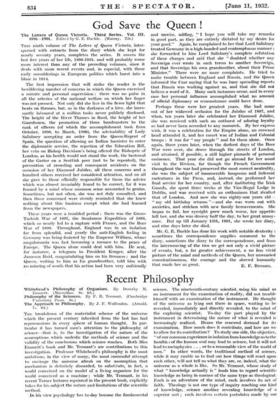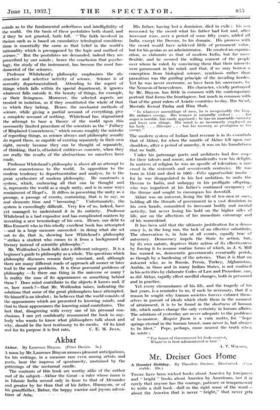Recent Philosophy
Whitehead's Philosophy of Organism. By Dorothy M. Emmett. (Macmillan. 8s. 6d.) The Approach to Philosophy. By .1. F. Wolfendon. (Arnold. Is. (id.)
THE breakdown of the materialist scheme of the universe which the present century inherited from the last has had repercussions in every sphere of human thought. In par- ticular it has turned men's attention to the philosophy of science—that is, to the investigation of the nature of the assumptions which underlie the methods of science and the validity of the conclusions which science reaches. Both Miss Emmett's book and Mr. Tennant's are contributions to this investigation. Professor Whitehead's philosophy is the most ambitious, in the view of many, the most successful attempt to envisage the universe afresh on the assumption that mechanism is definitely discarded, to substitute, in fact, a world conceived on the model of a living organism for the world conceived as a machine ; while Mr. Tennant, in his recent Tamer lectures reprinted in the present book, explicitly takes for his subject the nature and limitations of the scientific method.
in his view psychology has to-day become the fundamental
science. The nineteenth-century scientist, using his mind as an instrument for the examination of reality, did not trouble himself with an examination of the instrument. He thought of the universe as lying out there in space, waiting to be revealed, immediately and directly revealed, to the mind of the exploring scientist. To-day the part played by the instrument in determining the nature of what IS revealed is increasingly realised. Hence the renewed demand for its examination_ liow much does it contribute, and how are we to allow for its contribution?' To study one side, the objective, "of our common experience in isolation from knowledge as to the facultie; of the human soul may lead to science, but it will not lead to metaphysics. . . or to a reasonable view a the world of men." In other words, the traditional method of science, while it May enable us to find out how things -will react upon each other, will not tell us -what they are, or, indeed, what the universe as a whole is like. So Mr. Tennant, whose study of what "knowledge actually is" leads him to regard scientific knowledge as being in essence of the same type as theological. Each is .an adventure of the mind, each involves its act or faith. Theology is not one type of inquiry reaching one kind of knowledge, science another revealing knowledge of a superior sort ; each involves certain postulates made by our
minds as to the fundamental orderliness and intelligibility of the world. On the basis of these postulates both stand, and if they be not granted, both fall. "The faith involved in theism such as is based on cumulative teleological considera- tions is essentially the same as that belief in the world's rationality which is presupposed by the logic and method of science." But the postulates are demanded, indeed they are prescribed by our minds ; hence the conclusion that psycho- logy, the study of the instrument, has become the most fun- damental of the sciences.
Professor VVhitehead's philosophy emphasizes the ab- stractive and selective 'activity of science. Science is of necessity departmentalized. Attending to the aspect of things which falls within its special department, it ignores whatever falls outside it, the beauty of things, for example, or their livingness. Moreover, the selected aspects are treated in isolation, as if they constituted the whole of that to which they belong. Hence, the mechanist methods of science, while giving a partial account of everything, give a complete account of nothing. Whitehead has stigmatized the attempt to base a theory of the world upon this necessarily limited procedure of the scientists as the " Fallacy of Misplaced Concreteness," which means roughly the mistake of regarding things, as science always and philosophy usually do regard them, as capable of existing separately in their own right, merely because they can be thought of separately, of thinking, that is, of isolated entities as concrete, when they are really the results of the abstractions we ourselves have made.
Professor Whitehead's philosophy is above all an attempt to restore concreteness to the world. In opposition to the modern tendency to departmentalize and analyse, he is the great synthesizer of modern philosophy. He constructs a system, which, embracing all that can be thought and is, represents the world as a single unity, and is in some ways reminiscent of Hegel's. It differs in presenting the unity as a passage,. a passage of events, containing, that is to say, as real elements time and "becoming." Unfortunately, the system is exceedingly difficult. Very few of' us, indeed, have yet managed to understand it in its entirety. Professor Whitehead is a bad expositor and has complicated matters by inventing a new terminology of his own. Hence, our debt to Miss Emmett who in this wholly excellent book has attempted —and in a large measure succeeded—in doing what she set out to do, that is, showing how Whitehead's philosophy "strikes a student who comes to it from a background of literary instead of scientific philosophy."
Mr. Wolfenden's book falls into a different category. It is a beginner's guide to philosophy as a whole. The questions which philosophy discusses remain fairly constant, and, although there are many different roads of approach all sooner or later lead to the same problems. It is these perennial problems of philosophy —Is there one thing in the universe or many Is reality the sum of its appearances or something behind them ? Does mind contribute to the objects it knows and, if so, how much ?—that Mr. Wolfenden raises, indicating the solutions that some of the great philosophers have attempted. He himself is an idealist ; he believes that the world consists of the appearances which are presented to knowing minds, and that to them appearances the knowing mind contributes. The fact that, disagreeing with every one of his personal con- elusions, I can yet confidently recommend the book to any- body who wants to know what philosophers talk about and why, should be the best testimony to its merits. Of its kind
and for its purpose it is first rate. C. E. M. JOAD.



































 Previous page
Previous page